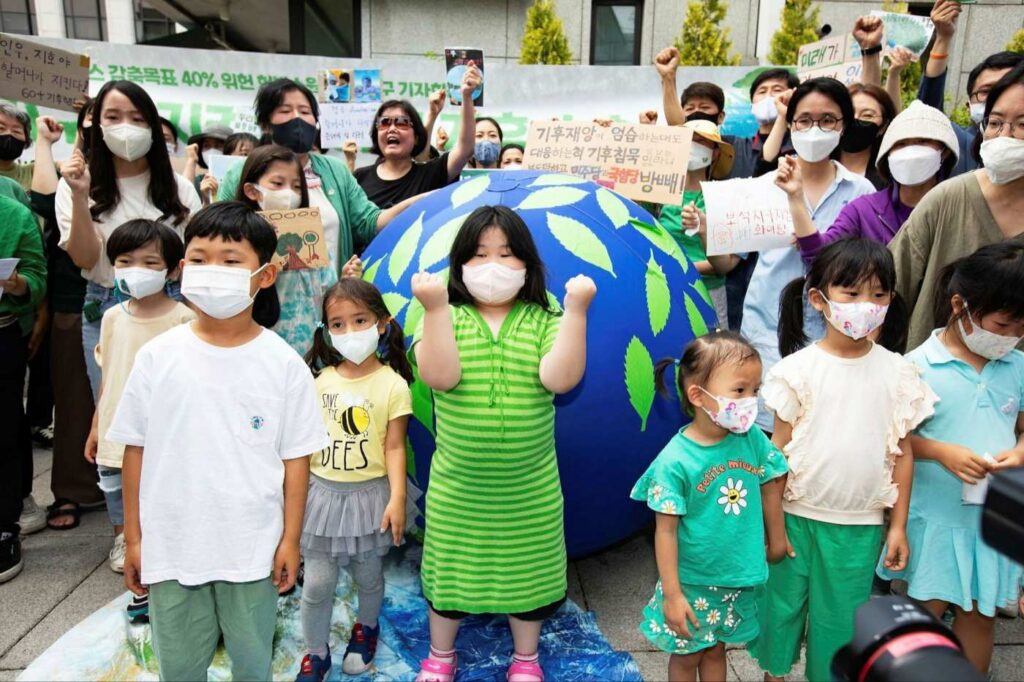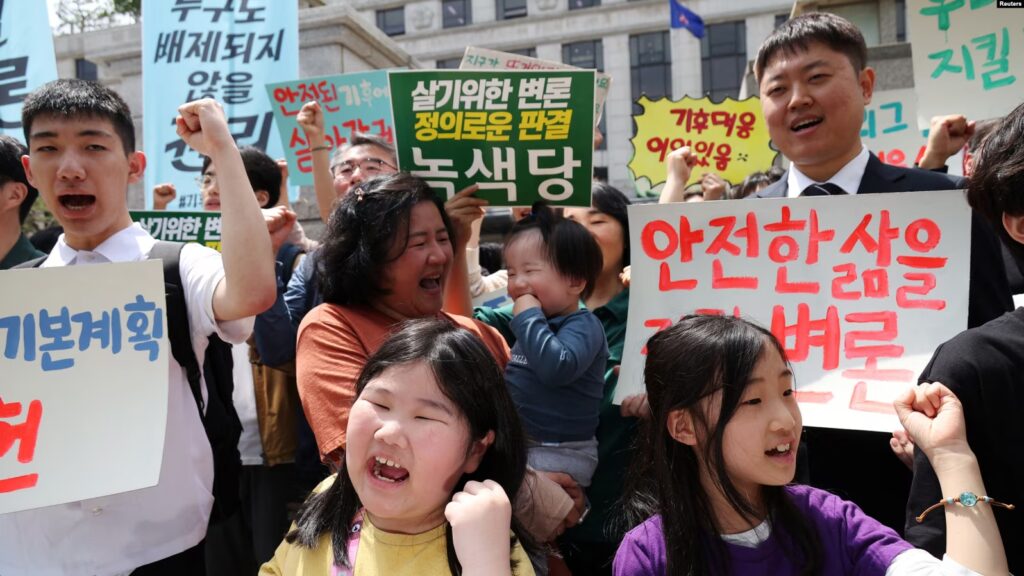South Korea: Climate Inaction Hearing Could Set Precedent in Case Brought by Children – and An Unborn Baby
5 Mins Read
South Korea’s constitutional court today held its final hearing on four landmark cases brought by the public against the government’s inaction on climate change. Experts say this could set a precedent.
The South Korean government is facing four citizen petitions accusing it of a failure to protect over 200 people – including over 60 children under five and an unborn child (at the time) – by not tackling climate change.
Today, the country’s constitutional court held its second and final hearing of the case (which is merging the four petitions), following the first hearing last month. While a decision is expected later this year, as the first case in East Asia to challenge climate change policies, it could set a major human rights precedent.
The plaintiffs argue that the government’s climate targets are too weak and threaten their right to live in a healthy environment. The hope is for a ruling that would force South Korea to be more ambitious in its next decade-long climate plan (known as nationally determined contributions, or NDCs), which all countries are set to update next year.
“The climate crisis is already upon us but the effects will be felt even more intensely by future generations. Cases like this are vital to safeguarding citizen’s rights,” said Jiyoun Yoo, climate justice campaigner at Amnesty International Korea.
Why South Koreans are suing their country over climate change

One of the cases is widely referred to as Woodpecker vs South Korea, a reference to the name given to the unborn child of would-be parents who filed the suit in June 2022. It’s partially based on the Enforcement Decree of the Carbon Neutrality Act, which mandates the country to set its NDC to reduce greenhouse gas emissions by 40% by 2030 (from a 2018 baseline).
The other cases were from 2020. One argues against South Korea’s Framework Act on Low Carbon, Green Growth, another claims that the aforementioned Carbon Neutrality Act violates the constitution, and the other accuses the government of failing to respect fundamental rights.
These include the right to life, right to pursue happiness, right to general freedom, right to property, and right to a healthy environment. The 200-plus plaintiffs also feel the state is failing to fulfil its obligation to protect them from disasters.
The four cases were merged into one earlier this year, with the first hearing taking place in April. “Carbon emission reduction keeps getting pushed back as if it is homework that can be done later,” Woodpecker’s mother, Lee Donghyun, said at the time. “But that burden will be what our children have to bear eventually.”
Lee Jongseok, the president of the court, said: “The court recognises the importance and public interest of this case and will make efforts to ensure that deliberations are conducted thoroughly.”
What the case could mean for climate litigation

Next year, governments are expected to revise their NDCs, a key tenet of the 2015 Paris Agreement that sought to limit global temperature rises to 1.5°C above pre-industrial levels, with an upper limit of 2°C. At present, the policies in place are on track to result in an increase of about 2.7°C. Even the NDCs at present will only limit warming to 2.5°C.
According to the Climate Action Tracker, South Korea’s NDC (with a net zero target for 2050) is “highly inefficient”. In fact, its current climate policies are currently only compatible with up to 4°C of temperature rises, compared to modelled domestic pathways. And if all countries held its level of ambition, the global heating would hike up to 3°C by 2100 – it’s a figure many climate scientists fear we’ll reach.
Sejong Youn, a legal counsel for the case, told the Nature journal: “If we have a constitutional ruling on the insufficiency of the current NDC [this year], we will be able to enhance the government’s climate ambitions while they’re working on the 2035 target.”
In East Asia, litigation is usually seen as a last resort, but that’s what makes this such an important case. “Taking legal action against a state is often a long and arduous process which requires patience and perseverance and the courage of these pioneering plaintiffs is to be admired and applauded,” said Amnesty’s Jiyoun.
If the plaintiffs lose, the constitutional court may be less likely to agree to hear climate cases again. But Mingzhe Zhu, a lecturer at the University of Glasgow, said: “Even if you lose this time, you can lose beautifully in the sense that you provoked social awareness. The very fact that this case went to the constitutional court – that is already a certain sense of success.”
But a win could have ripple effects, setting a precedent for future climate cases in the region. “If we have a favourable precedent in South Korea, I think that will really be a trigger in spreading this trend,” said Youn. “It will send a message: all countries need to take action in order to tackle this global crisis, and there are no exceptions.”
Globally, legal cases over climate change have spread like wildfire (pun unintended), spanning countries like the Netherlands, Pakistan, the UK, Italy, Turkey, Australia, Brazil, Peru, South Korea, New Zealand and India. Last month, the European Court of Human Rights delivered a landmark ruling in favour of a group of Swiss women who accused their government of human rights violations due to climate inaction. Switzerland now has a legal duty to take greater action, failing which, it could face further litigation and financial penalties.
And in another case involving the youth, climate activists in Montana, US registered a legal victory after a judge ruled that the state’s fossil fuel policy was violating their right to a clean and healthful environment




